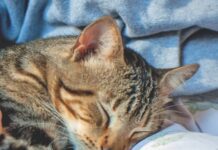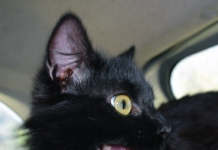SmartBrief tells us that “Overweight, sedentary cats will lose weight if the size of their daily meals is gradually reduced, according to research published in the American Journal of Veterinary Research, and although there was no statistically significant change in activity, it’s possible some cats will become more active as the weight comes off.” The report says, “The researchers reduced the cats’ food consumption by 20 percent initially, then continued with regular reductions, and the cats in the study lost weight and experienced changes in their gastrointestinal bacteria.”
The guidelines we shared from the American Association of Feline Practitioners in our January 2019 issue (catwatchnewsletter.com) offer ways to make your cat’s mealtimes more natural, including “hunting” for food, which can help with both exercise and behavioral problems.
According to a report in Pet Product News, Nationwide pet insurance states that pet obesity has risen 24 percent over the last eight years. Nearly a fifth of Nationwide pet insurance claims in 2017 were related to pet obesity—equaling a sum of more than $69 million in veterinary expenses.
According to Nationwide, the top 10 conditions related to or made worse by obesity are:
- -Bladder/urinary tract disease
- -Chronic kidney (renal) disease
- -Diabetes
- -Asthma
- -Liver disease
- -Arthritis
- -High blood pressure
- -Heart failure
- -Gall bladder disorder
- -Immobility of spinen



